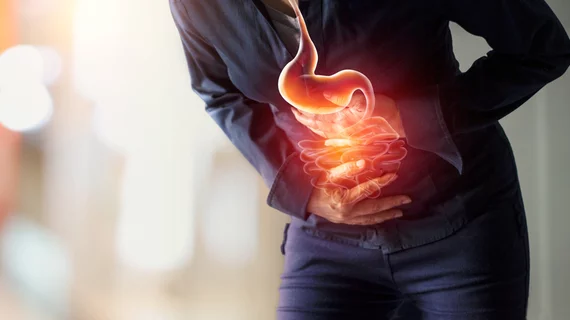Magnetic resonance elastography can accurately assess gut tissue in healthy patients and is particularly useful for diagnosing inflammatory bowel disease, according to a prospective study published Monday.
Standard MR enterography has proven successful for detecting IBD, but doctors cannot rely on it to guide therapeutic decisions. And while endoscopy with added biopsy assessment is also useful, the technique still has many shortcomings, including sampling errors.
German researchers successfully performed MR elastography in all 40 patients and reported high diagnostic accuracy for spotting IBD in a preliminary assessment, they wrote July 12 in the Journal of MRI.
Rolf Reiter, MD, with the Berlin Institute of Health, and colleagues believe their findings may help doctors and patients decide between medication and surgery.
“Our pilot results demonstrated the feasibility of MR elastography of the gut and showed excellent diagnostic performance in predicting IBD,” the group added in the study.
Among the 40 participants, 20 had IBD, while 11 were diagnosed with Crohn’s disease and nine with ulcerative colitis. Reiter et al. utilized multifrequency MR elastography using a single-shot, spin-echo planar sequence at 1.5T.
Results showed shear-wave speed (representing stiffness) increased by 21% in IBD patients, whereas loss angle (reflecting solid-fluid behavior) jumped by 20%. There were no major differences between ulcerative colitis and Crohn’s disease.
The study was limited by its small patient sample size, and the authors noted that current MR enterography usage relies on a combination of pulse sequences, contrast agents and subjective image interpretation, meaning more research is required before elastography can be added to the already established tool.
“Our results motivate further investigation of MR elastography of the gut as a short adjunct sequence to supplement current MR enterography protocols,” Reiter et al. added. “Especially, the diagnostic performance for the quantification of fibrosis and inflammation as well as the influence of bowel mater, bowel preparation with oral contrast agents and physiological changes to viscoelastic properties of the gut should be investigated in the future.”

